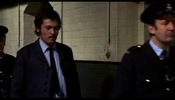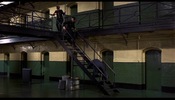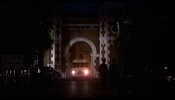HM Prison Wormwood Scrubs, London
HM Prison Wormwood Scrubs (informally known as "The Scrubs") is a Category B men's prison, located in the Wormwood Scrubs area of the London Borough of Hammersmith and Fulham, in inner west London, England
Hitchcock's Films
Frenzy (1972)
Initially, Hitchcock has intended to film the exterior of HM Prison Pentonville — the same prison as Arthur La Bern's source novel — but was granted permission to film Woomword Scrubs instead. The exterior of the prison is shown twice in "Frenzy" — firstly when Blaney is imprisoned after being found guilty and then again when he is taken by ambulance to St. Mary Abbott's Hospital (which stood in for Hammersmith Hospital).[1]
The interior was built at Pinewood Studios where footage of Jon Finch falling down the prison steps (onto a pile of cardboard boxes and mattresses) and then Finch's stunt double taking the fall where filmed on September 27th and 28th, 1971. The master shot of the inside of the prison was achieved with a matte painting by Albert Whitlock.[2]
The Short Night
In 1966, British spy and double agent George Blake escaped from Wormwood Scrubs and fled to Russia via Finland.
Hitchcock acquired the rights to Ronald Kirkbride's novel The Short Night, which fictionalised Blake's escape, after it was published in 1968 and seriously considered adapting it after Topaz (1969) before settling on Frenzy as his next project. After completing Family Plot (1976), he returned to the project and got as far as a complete draft script by May 1979 before abandoning it completely. David Freeman's script begins with an elaborate sequence showing Blake's escape from Wormwood Scrubs.[3]
Google Maps
Nearest Locations
- Lime Grove Studios, London (1.1 miles)
- Goldhawk Road, London (1.1 miles)
- Acton, London (1.8 miles)
- Coburg Hotel, Bayswater Road, London (2.3 miles)
- St. Mary Abbot's Hospital, Kensington, London (2.5 miles)
Film Frames
Selection of film frames: Wormwood Scrubs
Links
Notes & References
- ↑ Alfred Hitchcock's London: A Reference Guide to Locations (2009) by Gary Giblin, pages 261-64
- ↑ Alfred Hitchcock's London: A Reference Guide to Locations (2009) by Gary Giblin, pages 261-64
- ↑ "The Last Days of Alfred Hitchcock" - by David Freeman



